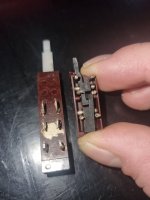I don't know. I repair all kinds of equipment from the 1920's up to modern stuff. Some switches simply can't be cleaned as the plating is worn off. Others will be fine.
Use a zero residue cleaner. If you can mechanically scrub the contacts - great! There are times when breakage taking the switch apart is the bigger risk.
Use a zero residue cleaner. If you can mechanically scrub the contacts - great! There are times when breakage taking the switch apart is the bigger risk.
Hy,[I want to use switches from 70s radio for my project]
Switches in vintage audio become unreliable when passing signals without a "wetting current". I think cheap switches would be ok if they activated a sealed relay which was designed for signal switching.
... https://en.wikipedia.org/wiki/Wetting_current
Thank you for showing your concern.
I was thinking about this as I came across "break-thru current" while reading about various contact lubricants.
The idea was to test it. I didn't dive too deep, but MCU analog input current is probably close to what DMM passes thru for resistance testing?
I get 0.0ohm readings for all the switches.
I was also thinking about mounting micro switches at the ends of those switches if problems would occur.
Hy, switches are done... apart from power switch, I'm working on it right now.I don't know. I repair all kinds of equipment from the 1920's up to modern stuff. Some switches simply can't be cleaned as the plating is worn off. Others will be fine.
Use a zero residue cleaner. If you can mechanically scrub the contacts - great! There are times when breakage taking the switch apart is the bigger risk.
Contacts are in good shape thankfully.
I had 2 sets and I only need one pair of contacts per switch, so I had the option to choose the best ones. I also wired a pair together for single switch.
I will mount micro switches at the ends of those switches if problems will occur.
Main goal is to keep the "mechanism".
Power switch is another type (the one where sticks close the contact and it is spring loaded in both sides).
I never remember seeing this type of switch lubed and I have a hard time opening it.

Can I just clean that one with spray and leave it unlubed?
I was thinking of just lubing the front white plastic and the spring.
I need to switch mains with that one.
Would it be better to use it for 12v DC relay coil switching or directly mains?
I never remember seeing this type of switch lubed and I have a hard time opening it.

Can I just clean that one with spray and leave it unlubed?
I was thinking of just lubing the front white plastic and the spring.
I need to switch mains with that one.
Would it be better to use it for 12v DC relay coil switching or directly mains?
It is a snap action switch.
I normally leave them alone unless they are arcing. You can get solid state switches and use the old switch to trigger it.
The biggest issue for most old switches are oxides. Just like silverware, they build up an insulating layer. Switches are designed to self-clean by swiping action. Left sitting, they don't get cleaned and that layer builds up. At this point you need a cleaning agent that attacks the oxide types you have. Then you would normally leave the contacts clean and bare, sometimes a layer of grease that does not oxidize. You don't want to attract dust either.
If you can mechanically wipe contacts with a cleaning agent, that's the best. However once the plating is gone, you are onto base metal. That switch will never operate reliably (it is worn out). You can use the original switches to operate signal relays and the higher current will typically work okay (unless that switch is worn out).
I normally leave them alone unless they are arcing. You can get solid state switches and use the old switch to trigger it.
The biggest issue for most old switches are oxides. Just like silverware, they build up an insulating layer. Switches are designed to self-clean by swiping action. Left sitting, they don't get cleaned and that layer builds up. At this point you need a cleaning agent that attacks the oxide types you have. Then you would normally leave the contacts clean and bare, sometimes a layer of grease that does not oxidize. You don't want to attract dust either.
If you can mechanically wipe contacts with a cleaning agent, that's the best. However once the plating is gone, you are onto base metal. That switch will never operate reliably (it is worn out). You can use the original switches to operate signal relays and the higher current will typically work okay (unless that switch is worn out).
- Home
- Design & Build
- Parts
- Cleaning and lubing old radio switches